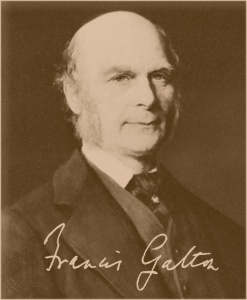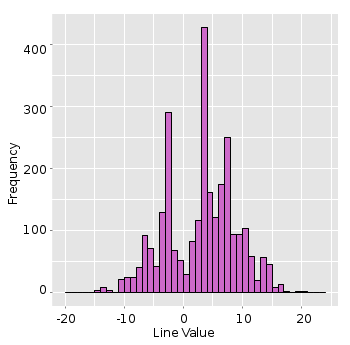Futures Betting
December 10, 2012
In a
previous article (All the Marbles, June 14, 2011), I discussed the century-old idea that polling a large group of people about a quantity, then averaging the response, gets you quite close to the actual quantity. One essential point, however, it that the individuals in the group possess some knowledge about the quantity. It would do no good asking persons on the street the most likely
mass of the
Higgs boson; but, questioning a group of
particle physicists would give you a reasonable "
guesstimate."
This idea of the "
wisdom of the crowd" goes back to
Victorian polymath,
Francis Galton. In 1906, Galton
observed a contest in which 800 visitors to a
livestock fair guessed the weight of
meat that would be produced by a particular
ox.
A hundred years ago, people who would attend such a fair had reasonable knowledge of what a
pound weight looked like "on the hoof," and how much of an ox would be useful meat. No individual guessed the exact weight, and there was quite a range of estimates, but Galton found that the
mean of the 800 guesses was within a
pound of the actual weight of 1,197 pounds. The mean was within 0.1% of the actual value.

Photograph of Francis Galton, with signature.
Galton was a scholar in many areas. He is best known to scientists as the originator of the statistical concept of correlation.
(image source and signature source, via Wikimedia Commons.)
Statistician that he was, Galton himself would have admitted that a single
experiment is merely
anecdotal and not really proof of anything. That's why
Stefan Krause of the
Department of Electrical Engineering and Computer Science at the
Lübeck University of Applied Sciences in
Schleswig-Holstein, Germany and his colleagues did a similar experiment. In their experiment, visitors to a
museum were asked to guess the number of
marbles in a jar.[1]
It's interesting that so much
anecdotal information about the wisdom of crowds has been presented in the hundred years since Galton, but until recently there was a lack of further experiment. For this experiment, Krause and his team did a
statistical analysis of the results that went beyond Galton's average.[1]
They analyzed the more than 2,000 guesses received by making
random groups from the total and determine the average for these groups. The analysis showed that the average guess for groups of forty or more ranked at the 99th
percentile of individual estimators.[1] Galton, with his 800 member sample, was vindicated.
Guessing the numbers of marbles in a jar is an entertaining diversion, but can the wisdom of crowds be harnessed for a useful purpose? In
another article (Prognostication, January 3, 2011), I wrote how the Internet has allowed the genesis of an efficient
information futures/prediction market.
Following the
proverb of "
putting your money where your mouth is," futures betting sites insist that you back your predictions with small amounts of money. The financial aspect forces betters to be more reasoned in their predictions. Evidence suggest that the
ensemble of such predictions is about as accurate as the prognostications of "
think tanks," although some would argue that's a rather low benchmark. Marcus P. Zillman has an excellent web site that contains links to many information futures market resources.[2]
Not surprisingly, much futures betting involves
politics, and the futures markets make better predictions than the
polls.[3] People may be interested in politics, but they're usually far more interested in
sports. A recent article, posted on
arXiv by
Greg Szalkowski and
Michael L. Nelson of the
Department of Computer Science,
Old Dominion University (Norfolk, Virginia), examines the collective wisdom of
US football fans in predicting the outcome of games.[4] Their analytical tool was the moving
point-spread for bets on
NFL football games.
According to Wikipedia, the concept of point-spread betting was invented by a
Connecticut mathematics teacher,
Charles K. McNeil. McNeil apparently became a
bookmaker in Chicago in the 1940s, proving again that teachers will take higher-paying jobs when available (Even highly paid
professors jump from
university to university, and from
chair to chair). The point spread system is an
equilibrium system in that the spread will change as too many people favor one team over another, and the bookie sees that he might lose money.
Szalkowski and Nelson used point-spread data from all NFL
regular-season and
post-season games from 2002-2011. They found that the difference between the opening and closing values acted as a predictor of
divisional winners with better than 75% accuracy, as shown in the table.[4]
| Year | Correct | | Year | Correct |
| 2002 | 7/8 | | 2007 | 7/8 |
| 2003 | 7/8 | | 2008 | 7/8 |
| 2004 | 6/8 | | 2009 | 7/8 |
| 2005 | 8/8 | | 2010 | 6/8 |
| 2006 | 6/8 | | 2011 | 6/8 |
The next time someone asks for an example of how mathematics enriches our lives, you can tell them about this advance in the
gambling arts.

Fans always believe that matches are, to varying degree, one-sided affairs, as shown in this bimodal distribution of the closing point-spread (line value) for NFL games in 2002-2011.
Positive values indicate a home-field advantage.
(Fig. 2 of ref. 4)[4].
![]()
References:
- Stefan Krause, Richard James, Jolyon J. Fariac, Graeme D. Ruxtond and Jens Krausee, "Swarm intelligence in humans: diversity can trump ability," Animal Behaviour, vol. 81, no. 5 (May, 2011), pp. 941-948.
- Marcus P. Zillman, Information Futures Markets Web Site.
- For an interesting discussion of the futures market as it applies to politics, see Bennett Haselton, "Legalizing Online Futures Betting," Slashdot, November 19, 2012.
- Greg Szalkowski, Michael L. Nelson, "The Performance of Betting Lines for Predicting the Outcome of NFL Games," arXiv Preprint Server, November 16, 2012.
Permanent Link to this article
Linked Keywords: Invariant mass; Higgs boson; particle physics; particle physicist; guesstimate; wisdom of the crowd; Victorian; polymath; Francis Galton; livestock; fair; meat; ox; pound mass; pound weight; arithmetic mean; mean; pound; scientist; statistics; statistical; correlation and dependence; correlation; Wikimedia Commons; statistician; experiment; anecdotal evidence; Stefan Krause; Department of Electrical Engineering and Computer Science; Lübeck University of Applied Sciences; Schleswig-Holstein, Germany; museum; marble; statistical analysis; randomness; random; percentile; information futures/prediction market; proverb; put your money where your mouth is; ensemble; think tank; politics; poll; team sport; sports; arXiv; Greg Szalkowski; Michael L. Nelson; Department of Computer Science; Old Dominion University (Norfolk, Virginia); American football; fan; point-spread; National Football League; NFL; Wikipedia; Connecticut; mathematic; teacher; Charles K. McNeil; bookmaker; professor; university; chair; equilibrium system; regular-season; post-season; National Football League playoffs; divisional winners; gambling; bimodal distribution; home-field advantage.